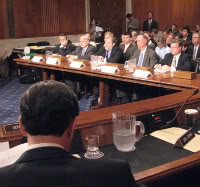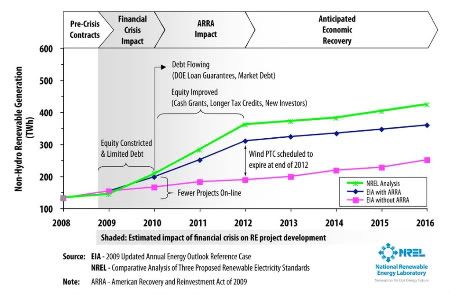Is Senator Schumer Killing Jobs and Renewable Energy Momentum?


Schumer specifically took aim at a large wind farm project in Texas. Announced last October, the project is a joint venture between Texas-based Cielo Wind Power, China’s Shenyang Power Group and the U.S. Renewable Energy Group. Cielo and U.S. Renewable Energy Group own 51% of the joint-venture. The project is expected to cost about $1.5 billion, and would be one of the largest wind farms in the U.S. When complete, the 600 MW project could generate enough electricity for 180,000 homes.
Cielo President Walt Hornaday said the company has not applied for stimulus funds, and that at least 70 percent of each turbine will be manufactured in the U.S. Vice Mayor Yang Yazhou oversees environmental protection and economic growth in the city of Shenyang. He said in a press release on October 29th, 2009 that the project would demonstrate “…how the two countries can share both the risks and the benefits in a huge wind power project.” (Reuters, Washington D.C., October 29, 2009).
On the morning of March 12th, plans were announced that two of the players Schumer has targeted, U.S. Renewable Energy Group and A-Power Energy Generation Systems, Ltd. (a shareholder in Shenyang Power and China’s leading provider of power generation systems) are to build a large wind turbine plant in Nevada along with America Nevada Group. The 320,000 +/- square foot property would employ about 1,000 Nevada workers. It would supply turbines for the Texas Cielo joint venture project as well as supply customers in North and South America. (Las Vegas Sun, “Plant to Bring Green-job Windfall”, by Stephanie Tavares. March 12, 2010). Will this news dampen the firestorm started by Schumer?
Clearly the U.S. needs to ramp up manufacturing sites as wind power grows. In response to the Schumer and the situation, The American Wind Energy Association’s CEO says, “We do not have the capability today to produce 100% of wind turbine components in the U.S., but we can grow our manufacturing base and add 274,000 American jobs if Congress passes a strong Renewable Electricity Standard.” (AWEA, Press Release, March 3, 2010).
Renewable Energy Standards
AWEA has been calling on Congress to pass national Renewable Electricity Standards for some time, and now industry leaders have embraced the idea. Leaders released a statement through AWEA on March 9th, 2010. Says Vic Abate of GE Energy, the largest supplier of wind turbines in the U.S. market, “We need to drive demand in a stable, predictable way. For jobs to grow the Renewable Electricity Standard is critical.” Added John Grabner, President of Cardinal Fastener & Speciality Company, “There are three main points to make about the RES: jobs, jobs, and jobs.”
More than half of the U.S. states have some renewable standards in place, but not all are yet implemented and others have escape clauses if the costs go too high, says the Energy Information Agency.
Constrained Capital Markets
Wind energy is capital-intensive on the front-end. According to the European Wind Energy Association, about 75% of the total cost for a wind project is related to up-front costs such as the turbine, foundation, electrical equipment, grid connection, etc. As the U.S. capital markets are constrained, many firms have been courting foreign investment. The tough economic situation and little debt or equity available are factors why government stimulus funds were designated to renewable energy projects.
The chart below, courtesy of the National Renewable Energy Laboratory (NREL) dated July 2009, illustrates the impact that ARRA or stimulus funding has on project development.
This chart was created before Treasury began taking grant applications, and charts the expectations. Clearly, stimulus (ARRA) funds will make a difference now and into the next decade.
Department of Energy Speaks
On March 9th, 2010, the Energy Department defended stimulus plan funding to foreign renewable companies that create U.S. jobs. Matt Rogers, senior adviser to the energy secretary, told the Senate Committee on Energy and Natural Resources that 100 percent of the $2.6 billion stimulus funds granted to renewable energy projects funded American projects. The $2.3 billion in tax credits will generate more than 17,000 jobs.
Asked about the Chinese-American joint venture in Texas, Mr. Rogers said that he has no application. “There is no Texas wind project other than on a press release. Until we have a project, we have nothing that we can actually evaluate.” New York Times, “Energy Department Defends Funding of Foreign-Owned Renewables Projects”. March 9, 2010.)
Rogers said that it was probably true than nearly 80 percent of the companies receiving grants were based abroad, but the funding resulted in $10 billion of foreign investment in the U.S. over the last year. “Frankly, we don’t care where the headquarters are, what we want are the jobs here.”
Renewable Energy Needs to Move Forward
Looking at the big picture, the renewable energy industry needs to move forward and it will take decades of work to reach the kinds of levels that we need. Foreign investment in the U.S. is going to be part of this growth, especially in light of the fragile economy and constrained credit markets. The world is smaller and more interconnected.
But Who Will Win?
Schumer may in his way be trying to protect jobs, but unfortunately it seems small-minded and misinformed. Yes, manufacturing jobs have disappeared over the last few decades and there are domestic problems. But it seems the U.S. has to be competitive and proactive not protectionist. If the Senator’s current legislation to block stimulus funding is successful, he will succeed in destroying U.S. jobs as well as hurting the tremendous momentum the wind industry has experienced in 2009.
However, if Senator Schumer wants to use his legislative clout to make a difference, he could get behind policies that put America and it’s industries in competition again. Supporting a federal Renewal Electricity Standard, for instance, would improve stability and investment into the clean-tech sector, and would grow jobs and opportunities for the U.S. The renewable energy industry is an exciting growth industry, but it takes capital and political backing – not obstruction.

